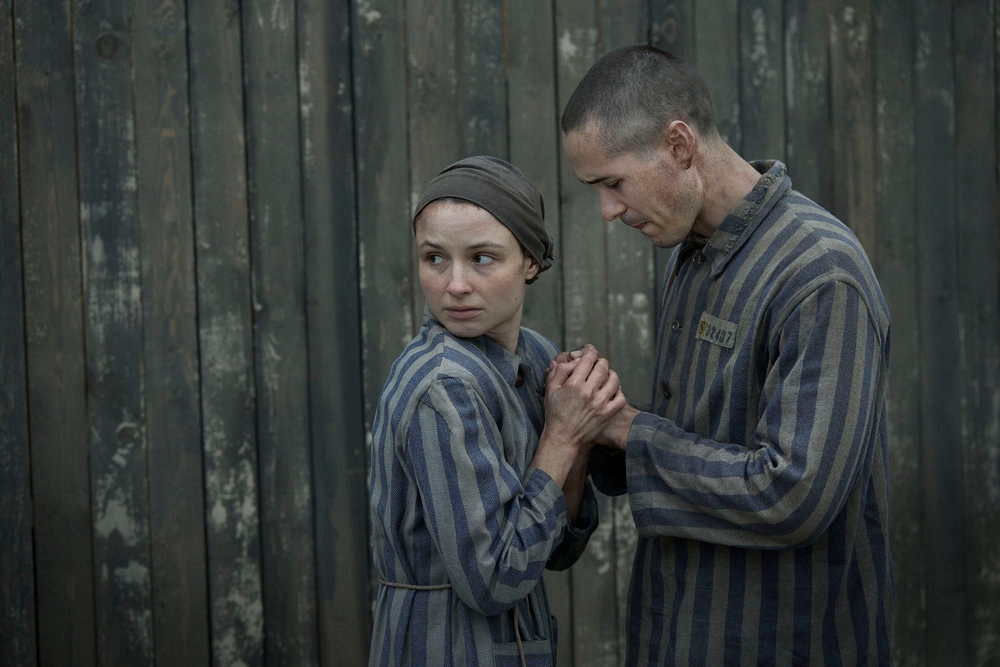Learning From The Complex Jewish Stories of FringeNYC

Charles Linshaw and Jeff Marcus perform in “From the Deep.” Image by Marc J. Franklin
It’s good, it’s bad, it’s very enthusiastic: FringeNYC has been rampaging through the city since August 12th, and will close on August 28th. I’ve been exploring some of the festival’s Jewish-interest offerings, and while some have closed, here’s what I’ve learned.
Gilad Shalit’s saga is still compelling
Cassie M. Seinuk’s “From the Deep,” which closed on the 21st, was a finely-wrought examination of the experience of captivity. Drawing from the story of Gilad Shalit, the Israeli prisoner of war held captive by Hamas for five years, Seinuk imagined a mental escape for people held in captivity around the world. In her two-man show, starring Charles Linshaw and Jeff Marcus, an Israeli prisoner of war (Linshaw) and a kidnapped Boston graduate student (Marcus) spend most of their time in a room with one another, playing games, discussing their lives, and trying to help each other through their situations. Occasionally summoned back to the world outside, the play was a graceful meditation on the human capacity for resilience and the moments in which that capacity falls short.

Jack Fry performs in “Einstein!” Image by Jesse Ashton
Albert Einstein’s is as well, kind of
Jack Fry’s solo show “Einstein!,” directed by Tom Blomquist, is an energetic race through the famous scientist’s obstacle-ridden path to creating and verifying the theory of general relativity. (Among those obstacles: a scheming elderly math professor determined to beat Einstein to the punch, a divorce, and a series of solar eclipses that refuse to be properly photographed.) Closing on the 26th, Fry’s passion for his subject is infectious, but his narrative roars too quickly through too many momentous events, both personal and scientific, to be fully effective. There are scenes of great emotional potential – primarily those involving Einstein’s interaction with his son Hans, who Fry embodies with a shy, hesitant resentfulness – that don’t register as it feels they might, if given a little more space to breathe.

Mischa Ipp performs in Elena Zucker’s “Thread.” Image by Little y
Not so compelling: Elena Zucker’s Tangled “Thread”
“Thread,” written and directed by Zucker and starring Mischa Ipp, reaches to join Judaism’s ancient Roman conflicts to the Israeli-Palestinian conflict of today. Alas, the frenetic performance, which also runs through the 26th, is too enamored of its own cleverness and brashness to be effective. Zucker’s script skips through time and place, mood and character, without effectively drawing connections between her subjects; Ipp’s preferred method of communicating meaning is to increase the volume and intensity of her delivery, leaving it still one-note, but louder.

Juanita Cox performs in “The Bible Women’s Project.” Image by Tara Brooke Watkins
Urgent and complicated: “The Bible Women’s Project”
Starting with a story circle at the Christian Eastern Nazarene College, “The Bible Women’s Project,” which closed on the 24th, was an earnest exploration of the stories of women in the Old and New Testaments. The ensemble-created show moved through a variety of genres – musical theater, talk show, interpretive dance— with relative deftness, bringing necessary attention to the ways in which the Bible’s women are misunderstood and degraded. When I saw it, I was disappointed by the way the show skipped over the Jewishness of the women of the Old Testament; in the tale of Hannah and Peninnah, for instance, the Jewish Hannah was depicted praying to “Our Father who art in Heaven.” That won’t be around much longer: I published a review of the production that dwelled on that kind of omission, and the cast and crew, after reading it, decided to more thoroughly incorporate the Judaism of the Old Testament’s women in their show. Their bravery in opening their understanding of the Bible, and in bringing that expanding understanding to audiences, made their show one that was uniquely beautiful.
And last, a meditation on the burdens of being a survivor
In Emerging Artists Theatre’s “Murmurs and Incantations,” which closes on the 28th, the aging performance artist Ben Levitts travels to Poland to exhibit a new piece in collaboration with the woman who hid him and his mother during the Holocaust. While there, Levitts, a survivor of the AIDS epidemic still confronting his guilt over his partner’s death, forms an unlikely creative partnership with the ghost of his grandfather, a rabbi who was killed by the Nazis. The show, written by Dahn Hiuni, is heartfelt but uneven, and offers little in the area of new or breathtaking insights. Still, it’s a touching reminder of the things that hold people together, even and especially in the wake of cataclysmic events.
Talya Zax is the Forward’s summer culture fellow. Contact her at [email protected] or on Twitter, @TalyaZax

I hope you appreciated this article. Before you go, I’d like to ask you to please support the Forward’s award-winning journalism this Passover.
In this age of misinformation, our work is needed like never before. We report on the news that matters most to American Jews, driven by truth, not ideology.
At a time when newsrooms are closing or cutting back, the Forward has removed its paywall. That means for the first time in our 126-year history, Forward journalism is free to everyone, everywhere. With an ongoing war, rising antisemitism, and a flood of disinformation that may affect the upcoming election, we believe that free and open access to Jewish journalism is imperative.
Readers like you make it all possible. Right now, we’re in the middle of our Passover Pledge Drive and we still need 300 people to step up and make a gift to sustain our trustworthy, independent journalism.
Make a gift of any size and become a Forward member today. You’ll support our mission to tell the American Jewish story fully and fairly.
— Rachel Fishman Feddersen, Publisher and CEO
Join our mission to tell the Jewish story fully and fairly.
Only 300 more gifts needed by April 30

























